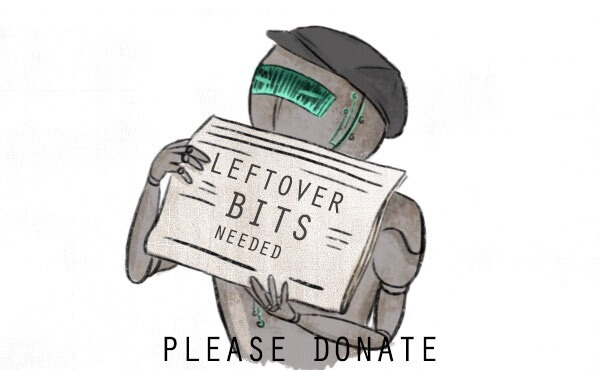
The Department of Justice, the Chamber of Digital Commerce and Coin Center have created a co-operative forum called the Blockchain Alliance, where they can work together to reduce crime in the digital currency space. A large portion of the Bitcoin community has reason to be distrustful law enforcement, for a variety of reasons. Either for political ideological reasons or practical reasons, because their line of work could be perceived as something law enforcement might take interest in. Those concerns, other than for those legitimately working in illegal spaces, are misguided.
Bitcoin needs law enforcement. That isn’t a popular thing to say for a digital currency that has so much of its ideology wrapped up in individualism, but it is nevertheless true. The cryptocurrency space has proven, over and over again, of being incapable of policing itself, at least in its current form with its current technology.
I have spoken somewhat disparagingly about Libertarians in the past, or more specifically their insistence that their ideology was Satoshi’s and is inseparable from the currency. But that doesn’t change the fact that I respect Libertarians for having a consistent world view and find intelligent Libertarians as some of the most enjoyable people to debate. There is nothing wrong with being a Libertarian, but there comes a point where ideology and practicality come to a head, and that is where we are at now with Bitcoin and law enforcement.
In a perfect world, the Cryptocurrency community and the Cryptocurrency media would be all the community would need to protect itself. Despite some very valuable contributions from both members of the Bitcoin forum and certain media organizations, that perfect world has yet to materialize, and it looks like anything close to that is far from happening.
I consider myself a pragmatist. Rather than strictly subscribing to any one ideology, I advocate for experimenting with what has worked in the past and modifying or eliminating the things that have proven to be unsuccessful. Expecting the community to police itself has proven to be unsuccessful. In the future, perhaps systems will be created that make it more difficult to scam people using digital currencies, but as it stands now, we could use some law and order.
Like Libertarians, my initial stance on nearly everything is to let the free market take care of things. Unlike Libertarians, when that policy fails to reasonably protect people, I advocate taking a different approach. That doesn’t mean we instantly switch to a state-maintained blockchain controlled by the very people Bitcoin adopters wanted to leave behind. It simply means that we need to brainstorm some new ideas.
The problem is that the very people we would need to brainstorm with, are more or less clueless about digital currencies. Things are improving quickly, but there have been some bumps along the way and by and large, law enforcement doesn’t seem to be aware of where the real problem points are in the digital currency space.
It is impossible to know what, exactly, law enforcement wants out of this. But I can tell you what I would like to see, and what I think the community should be pushing for. First, we have to determine what crimes or other compliance issues are common in Bitcoin and what ones we would like to see law enforcement dedicate resources to. In no particular order:
- Exchanges with fractional or non existent reserves
- Ponzi Schemes
- Illegal media like Child porn and similar
- Drugs and Weapons
- Money Laundering
- Extortion/Ransomware
I am well-aware that these problems are in no way exclusive to bitcoin. Simply because bitcoin is the currency facilitating the transaction of an illegal deal does not mean that illegal deal would not have happened if it were not for Bitcoin. Child porn, undoubtedly the most sensitive issue on that list, was a problem on the internet well before Bitcoin came onto the scene.
Nevertheless, it is something that law enforcement should be working to stop and if the bitcoin community can help educate them on how to better track or catch predators, then we should do that. But, it isn’t something that should be defined as “policing the community.” Pedophiles are in their own community. That they happen to use bitcoin is an unfortunate but ultimately inconsequential connection. I doubt there will be many arguments against my assertion that pedophiles are bad and that we should do what we can to make Bitcoin unattractive to them, so let’s move on to the other criminal acts associated with Bitcoin.
The other issues are much more intertwined with the Bitcoin community. Exchanges operating with less money than they owe their customers is a major issue. Yes, fiat banks operate on fractional reserves all the time, but banks also have the ability to borrow money created out of thin air, cryptocurrency organizations don’t have that luxury. It wouldn’t hurt to have an organization with the authority to demand that an exchange open its books and show the public exactly how much money they have. This should be happening already, but it too often doesn’t. Mt. Gox is the most visible example, but there have been a near uncountable number of exchanges that have gone down because for one reason or another, they didn’t have as much money as their customers put in.
Which brings us to the next issue on the list: Ponzi Schemes. Ponzi’s are surprisingly easy inside the cryptocurrency space. Truthfully, that is usually the case in any emergent technology. Ponzi schemes had a major resurgence after the internet hit the mainstream. Regardless, they have been a cancer in our community, gathering up new users, chewing them up and spitting them out once all possible wealth has been extracted from them. This is investment, growth and reputation all being flushed down the drain. The people scammed in Paycoin, to use just one example, drawn to it like flies to honey thanks to articles in mainstream media blogs, aren’t coming back to cryptocurrencies for a very long time. Their friends and families too, are now less likely to jump into cryptocurrencies any time soon, having just seen a love one burned so badly. Not only could all of that money invested into Paycoin have gone into legitimate bitcoin companies, but anyone who knows that person and may have otherwise invested into Bitcoin, are now going to be more hesitant.
If there was some sort of vetting organization, it could go a long way in helping investors realize what organizations are Ponzi schemes and which aren’t. The SEC, in theory, holds some of that responsibility, but what we need is a more nimble organization that can get onto these schemes before they do their damage. An organization that can instigate a public investigation quickly and then have the ability to announce that either the company has passed its test, or that a more thorough investigation (perhaps by the SEC) is underway. The organization could also be more responsive to whistle blowers and concerned investors than the SEC, who tends to take a mostly silent, plodding approach to these kind of investigations. If law enforcement is serious about cleaning up the cryptocurrency community, then it needs an organization that is almost as quick and agile as cryptocurrencies themselves.
Extortion and ransomware are two other issues that have a huge negative impact on Bitcoin’s reputation, disproportionate to the number of people it affects directly. Every time a new version of Bitcoin ransomware hits the web, mainstream technology media outlets dust off their “Bitcoin keyword guidebook” and report on it. Ransomware, if you are unaware, is the term for a piece of malicious software that typically cryptographically locks a computer’s files and then demands payment, usually in the form of bitcoin, in order to unlock them. Paying the ransom, according to reports, only unlocks the files occasionally. This is circumstantial, but I don’t know anyone who has been affected by Bitcoin ransomware, but every bitcoin person I know has heard of the problem. That means, regardless of how few people are affected directly, the perception that Bitcoin is the currency of criminals has been enhanced thanks to these reports. Reports of DdoS extortion groups like DD4BC are also harmful to Bitcoin’s reputation. I think it is reasonable for the community to ask law enforcement to make ransom and extortion, two crimes that definitely have victims, to be a priority of theirs.
Now, we approach a fork in the road, the versions of crime within the bitcoin community that many in the community wish weren’t crimes. The sale of illegal goods like guns and weapons and the movement of wealth without government permission. There are many in the community, myself included, who would prefer that law enforcement either ignore entirely or take a light hand with these issues. Unfortunately, that is unlikely.
The US Government loves itself some drug war. Regardless of how many empty platitudes President Obama offers, the drug war is still continuing. Billions are still being spent on arresting and locking up non-violent offenders whose only crime is putting non-approved chemicals into their body and their only victim is their own liver, kidney, lung, heart, nose or brain.
There is likely nothing we can do to lessen or end the government’s obsession with drugs from within the Bitcoin community. Outside of the community funding a Political Action Committee with the focus of reforming our drug laws, I doubt anything anyone from the Bitcoin community can say will convince them to not target and arrest sellers and buyers on dark marketplaces.
One possible solution would be to slowly transition the currency of choice for illegal goods to a more anonymous cryptocurrency. This isn’t something the community can make happen, at least not through some sort of mandate. But if enough sellers feel unsafe using bitcoin because they know law enforcement is knowledgeable about the currency, they may see some benefit in using an alt with more security features. If that happens, the next big news story about a dark marketplace getting busted may say the site was powered by a “bitcoin-like” currency, which is only marginally better than simply saying it was powered by bitcoin, but it is better nevertheless.
While such a move would make things difficult for law enforcement, it would be beneficial to nearly everyone else involved. Buyers and sellers would gain more anonymity from a coin that can provide it. The bitcoin community would see less association between its name and drug and weapon dealers, and whatever altcoin was adopted by the underground community would instantly gain a usecase and likely see a correlating jump in value similar to Bitcoin’s early jumps when it became the preferred currency of underground internet drug markets.
Again, law enforcement won’t be happy about it, but ultimately they are arresting people who have committed no moral crime. There seems to be little to no room for negotiation considering the government’s stance on drugs, so there is little point in co-operating with them on the issue. The best thing we can do is move that responsibility to another coin’s community that will be happy to have the volume and has the tools to compete with law enforcement in the ongoing drug war.
Which leaves us money laundering. This, I imagine, will be the most contentious issue. Unlike the drug war, there is substantial room for debate and negotiation. The thing the government values above all else is getting its money, so seeing a scenario where there is no regulation on money laundering is unlikely. Where we need to make some headway is in keeping those regulations as simple and straight forward as possible. We don’t want a national version of the Bitlicense, which is far too expensive for many startups to deal with, but what its revisions showed is that regulators are willing to listen to us, even if they don’t always comply.
Keeping things inexpensive on the business end is important, but it is also important to keep things accessible on the consumer end. If someone is interested in buying bitcoin for the first time and they want to start with a small amount, they shouldn’t have to worry about complying with know-your-customer (KYC) and anti-money-laundering (AML) laws. When attracting new users, like any business, it is important that there are as few barriers to entry as possible. If John Q. Public decides he wants to buy ten bucks worth of bitcoin so he can try it out, only to find out that he has to upload personal documents and digitally sign a waiver or whatever else he would need to do, how likely do you think he is to do it?
A low barrier to entry is the only way a new technology like bitcoin can grow and eventually thrive. Google didn’t put out the Google Cardboard headset because it thinks it can compete with the Rift, it did it because $0 – $20 for a headset is a price people are willing to pay in order to experience virtual reality for the first time. Google is hoping that by helping create a Virtual Reality market, they will eventually find a way to profit off of that market in a meaningful way.
The same applies to Bitcoin, and we need to make that clear to regulators and law enforcement. Yes, we can disagree with their assertion that the movement of wealth falls under the purview of the government, but their opinion on that matter is unlikely to change. A decentralized marketplace that they can’t regulate will go a long way towards giving negotiating power to the centralized markets that the government could regulate, but some sort of regulation is likely to come and it will be beneficial to go to the negotiating table and attempt to convince them to pull back on the more harmful rules.
It does cause a uncomfortable feeling, reading that the stalwarts of the community like the Chamber of Digital Commerce and Coin Center are actively working with the Department of Justice to deal with the crime problem in Bitcoin. The criminal element of Bitcoin, for all the harm it does to the community, almost seems like part of the fun. Some of the criminals are, depending on your politics, sympathetic figures, and there are many in the community would rather those criminals not get caught. But not talking to law enforcement isn’t going to make them go away. Dialog is important to ending any conflict. If they are willing to have one, the bitcoin community needs to be represented there. Uncomfortable or not, there is nothing to be lost in stating our case.

Dealing with law enforcement is never fun, but we hope reading this article was. If you think this article was worth a mBTC, we would love to have it. Your donation will go a long way in making sure CoinJournal is able to provide you with the web’s most honest journalism with no outside influences. We need your help to continue our ad-free model and would appreciate any donations of any size. Please consider visiting our donation page or use the QR code below.


